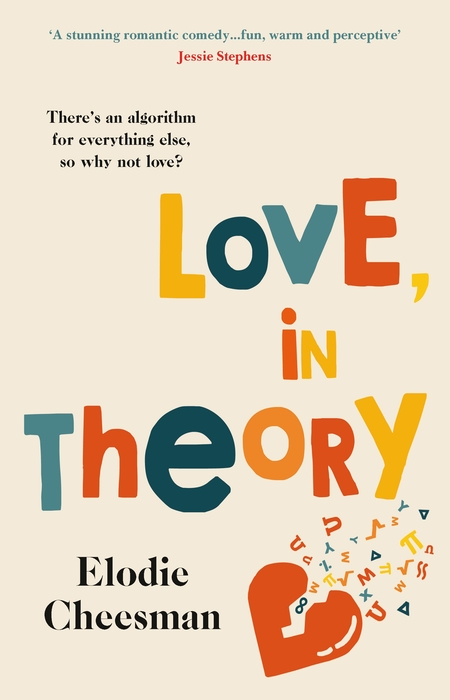The heart vs. the head.
Not quite a battle as old as time but almost; throughout our relatively short evolutionary history, humanity has long debated whether it is better to let the heart rule ,with its passion and spontaneity, or to leave the head hold sway as it calmly invokes logic and rational thought to reach a good and hopefully perfect place.
Nowhere is this great debate more starkly demarcated than in the often frustrating, sometimes wonderful search for love, with people torn between the alluring idea of soulmates, true love and attraction beyond measure, and a sense that all you need to find someone, anyone compatible really, is to think calmly, assure their attributes and your options and calmly and sagely make a decision.
In Elodie Cheesman’s debut novel, Love in Theory, a romantic comedy that takes a brave deep dive into the complicated waters of modern love in all its digital glory, the great debate is on in full force with 24-year-old Sydneysider Romy, a lawyer reasonably fresh out of law school whose wondering, among things, if corporate life really is for her, and whether there really is something called true love and how best she can find if, in fact, it does exist.
Convinced by her mother, her aunt and a number of others that a rational approach is best since lust and passion, while delightful, vanish, in time, like the morning mist, Romy sets about to find a man she can settle down for life with an algorithmic determination that would leave a hardened statistician green with envy.
“‘It’s just … ugh –‘ I let out a rattle of frustration ‘– How do people even get together these days? Besides just drunkenly hooking up enough times that, ipso facto, they’re in a relationship?’ I can’t help but make a moue. ‘It was so easy to find your life partner back in the day. All you had to do was wait for a Darcy or Bingley to roll up to your village, hope you weren’t the Mary of your sisters, and wait for him to comment favourably on your pianoforte playing. Or add him to your dance card at the naval ball. Or just grow up on the same block and at some point agree to share a malt at your local milk bar. Whereas now, it’s impossible.’
Cameron looks at me with bewilderment. ‘You want to return to a time when you just had to wait for some guy to proposition you? Based on how much land and how wide your hips were?’
‘Well, I’d have been fine on that point,’ I parry. The hips, not the land …'” (PP. 21-22)
Roy goes down this road largely because, though she’d never admit this to herself, because she has been savagely burned by following her heart in the past.
Two terrible, deceitful and less than committed ex-boyfriends have convinced that she needs a whole lot less starry-eyed wooziness and a whole lot more sober balancing of the romantic equation.
As a concept it sounds reassuringly straightforward and since it yields handsome, funny and thoughtful German engineer Hans, in Sydney for work – the prominent featuring of both the city’s iconic and quirky locales such as the Opera House and Newtown give a real sense of place – Romy thinks she has struck gold.
Goodbye rom-com meet-cutes and heart palpitations with eyes locking across a crowded room and hello careful and considered weighing of what’s wanted and needed in a partner, and impassionate commitment to a relationship that may not be exciting necessarily but which is stable, safe and cosy calm.
Mission to find true love, or at least true like, unlocked; now, let’s sit back and wait for life to do wonderfully sweet and yet calmly sober things.
But there’s the thing – while Hans might be the poster boy for algorithmic love, James, a funny, benignly roguish graphic designer with a love of creativity and, quite possibly Romy, is very much in the picture and even though Romy tells anyone who will listen that they are just friends, it begins to look more and more like James might be the one to upset the thoughtfully stacked apple cart of romance.
Not, of course, that Romy will even let herself begin to think that.
No, in true romantic comedy style, Love in Theory is all about a healthy dose of self-delusion, wrong priorities that our bubbly, bright and fun protagonist convinces are absolutely the right ones, and the errant sense that the unruly beast of love can be constrained, even tamed, by a few well-placed bon mots of sage-like wisdom.
Were that it was that easy!
Cheesman quite beautifully evokes what it feels like to want romantic love more than anything, to crave it and to think that it’s possible to corral something that feels quite magical and ethereally elusive much of the time into a place where it can be controlled, dissected and brought happily to heel.
Romy is the perfect protagonist for just such a novel, a mix of loving care and filial devotion with bottled-up passion that life’s inevitable scars have conspired to repress so far down she’s willing to entertain the idea that love is all 0s ands 1s and not a sigh-heavy gaze of longing adoration.
The head and the heart are going at in Love in Theory and Cheesman makes it thoroughly entertaining, delivering up a thoroughly loveable, accessibly fallible protagonist, a cast of well-realised and likeable supporting characters in besties Paloma and Cameron, each either with a partner or on their way to having one the old-fashioned passionate way, Romy’s quite different from each other but caring parents, and a narrative that neatly dances between the rational and the lovestruck.
“I feel myself colour. I don’t know why it’s taken me so long to bring up the fact that I’m dating someone. And now, I’m cornered. It would be weird not to mention Hans, but it’s hardly fair to classify him as ‘some boring, sensible dude’. I struggle with how to phrase it; how to sound casual yet do Hans justice.
‘Well, actually, I am dating someone now. His name is Hans. He is good on paper, and in person, and I don’t feel ay all like I’m settling.’
‘Um, way to bury the lede,’ says James with a little surprised laugh. He studies my face. ‘But that’s great. Good for you.'” (P. 177)
Rather happily, while Cheesman observes a reasonable number of rom-com conventions such as the will-they-won’t they tussle and the rush to declare true feelings in the final act – thankfully no airports were harmed in the writing of this novel – she infuses Love in Theory with a health degree of originality thanks to her dedication to exploring what it means to put the heart aside for the head, and if that is, ultimately, even remotely realistic.
Rounding out the novel is that Romy is far more than just the sum of her romantic life.
Yes, she is serious about finding a guy to call her own, and true, she dedicates much of her life outside her highly-demanding legal career to finding him through a wholesale commitment to logical assessment of the facts at hand, but she is also someone who likes art, silly quips, really getting into something (she sounds like a disciple for the new religion of rational love at times, much to the amusement of her friends and James) and being wholeheartedly a part of peoples’ lives.
She is a full and complete, if emotionally damaged (aren’t we all?) person and watching her bounce between her heart and head – more the latter than former for much of the book but then she can’t follow her heart too early on or goodbye rom-com magic – is a lot of fun, a great deal more emotionally resonant than you might expect and a hopeful nod that maybe, just maybe, going with your romantic gut is the best way forward in a world hilariously disinclined, almost rebelliously so, to neatly toe the algorithmic line at the best of times.

